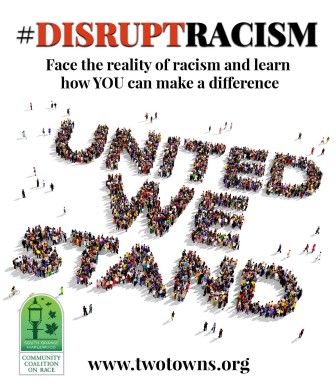From the South Orange-Maplewood Community Coalition on Race:
Please find below 10 Ways to Disrupt the Cycle of Racism, a list produced by the South Orange/Maplewood Community Coalition on Race for the community and the nation at large to #DisruptRacism on the mark of its 20th anniversary. A social media campaign with memes for each tip has been launched to spread the word and inspire people.
How is America going to thrive at a time when discrimination and racism are tearing the country apart? If Americans want to stop the cycle of racism, they must come together to talk about race and find solutions. The South Orange/Maplewood Community Coalition on Race, based in New Jersey, is taking a stand to share its best practices and lessons learned from 20 years of sustained racial integration in South Orange and Maplewood (SOMA). They are often named the two most desirable towns in the state to live.
To inspire and empower Americans to think differently and disrupt racism, the South Orange/Maplewood Community Coalition on Race has compiled a list of 10 Ways to Disrupt the Cycle of Racism. From parents and teens to teachers and politicians, this list speaks to citizens nationwide who may not realize the power they have to move this country in a more racially equitable and inclusive direction. It is time we come together to recognize what’s wrong, why it’s happening and what we can do to eliminate racism and create positive change. Let’s #DisruptRacism.
- Face the reality of racism, and learn how YOU can make a difference
The Community Coalition on Race hosts quarterly Coffee House Discussions in restaurants for residents to discuss emerging racial integration and justice concerns within the community.
- Use your power to counter racism on every front—at home, at work, at the polls…
The SOMA youth group Movement with Purpose launched a #NotInOurTwoTowns open-mic event and community pledge in response to the recent race-based killings in the nation. In partnership with the SOMa Clergy Council, Community Coalition on Race, government officials and the police department, the event enabled residents to ask questions and bring up important issues in a safe environment and to sign the #NotInOurTwoTowns commitment banners.
- Seize teachable moments: Respond to racist acts as they happen
The Coalition prints pocket-sized “SPEAK UP! Against Bias” pamphlets using language from Teaching Tolerance to guide the community on how to respond to everyday racism and stereotypes.
- Resist stereotyping: Invest the time to get to know people as individuals instead of groups
Monthly Integrated Playgroups for children aged 6 months to 5 years are hosted by the Coalition to build authentic relationships and create pathways to social integration for both parents and kids.
- Take the risk to build authentic relationships across racial and ethnic lines
The Coalition launched Integration through the Arts to provide high-quality art experiences (e.g., Make a Shekere workshop, My Story videography classes/competition) for residents to break down the barriers of cultural and social segregation.
- See color: Acknowledge racial and ethnic differences and celebrate diversity
The annual XRootsFest (pronounced CROSS-Roots-Fest) in SOMA, a free festival open to the public, features regional musicians, dancers, storytellers, merchants and food vendors rooted in the cultures of four continents.
- There’s power in knowledge, so learn about systemic racism
This year, retired Spelman College President Dr. Beverly Tatum presented a moving speech on race in America to 200 residents during the 16th annual Conversations on Race in SOMA. She reminded us that we are not living in a post-racial world, but rather in a 21st-century version of the Reconstruction era. Although there have been gains, some reactionary forces among racist populations are gaining ground and finding new leaders who echo their (oftentimes) “silent hate.”
- Hold leadership accountable for racial progress
Racially inclusive policies and practices should be in place to create and sustain integration. The Coalition’s Annual Board of Education Candidates’ Forum, open to the public, presents candidates with a series of questions that challenge them to consider the relationship between school policies and integration in the SOMA community.
- Talk to your children about race; avoidance sends the wrong message
The Coalition hosts “Talking to Children about Race,” led by local experts, to help parents, educators and the community learn best practices for approaching this sensitive topic and brainstorm ways to improve anti-bias trainings in the school system.
- Be intentionally, racially inclusive: Listen to and engage all racial groups for better outcomes
The Coalition’s Civic Engagement Institute provides training and education for underrepresented groups in the SOMA community to increase participation and the probability for success when volunteering and holding leadership roles in civic, community and government organizations.
These 10 tips are being shared as memes on social media with the hashtag #DisruptRacism between now and December. Paul Baron designed the memes. Connect with the Coalition on Facebook, Instagram and Twitter to help spread the word.
About the South Orange/Maplewood Community Coalition on Race
The South Orange/Maplewood Community Coalition on Race is celebrating 20 years of being a nationally recognized non-profit organization committed to building a unique, suburban community that is free of racial segregation in housing patterns and community involvement. The Coalition was founded in 1996 by a diverse group of citizens concerned about stagnating property values and a perceived decline in the quality of local public schools. Three key strategies were developed: promote strong and sustained robust demand by all racial groups for housing in every area of our community; build a community where the leadership of civic, governmental, business and community organizations is racially inclusive and values integration in policy and practice; and promote dialogue and understanding on race-related issues. To learn more, go to www.twotowns.org and connect with us on Facebook, Instagram, Twitter and YouTube.


